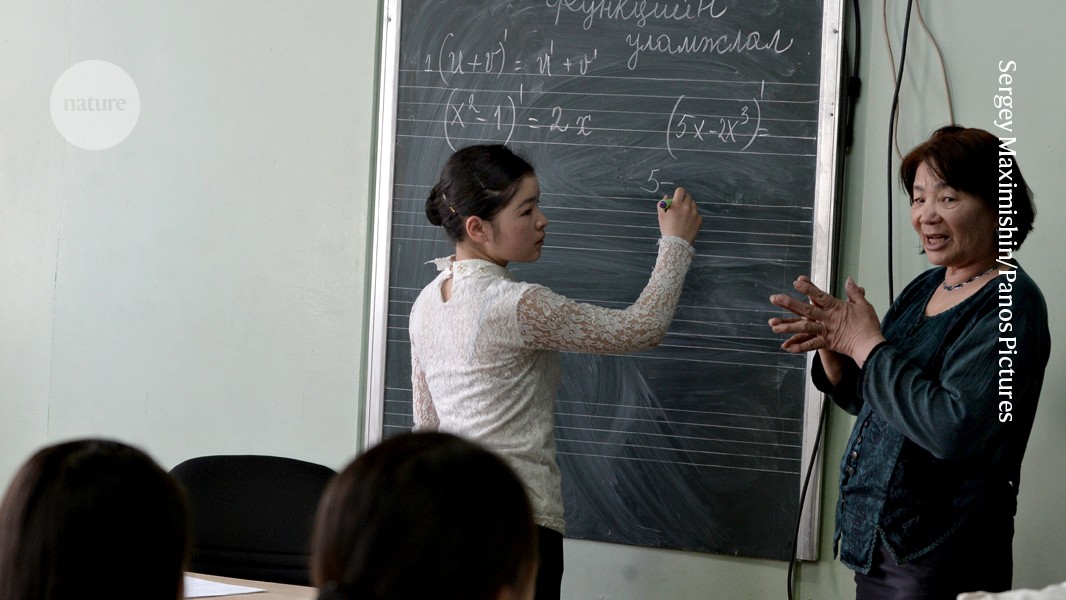Close the mathematics gender gap: huge study prompts urgent call to action

Researchers reveal when boys pull ahead of girls in mathematics, sounding an alarm and providing both an opportunity for schools, parents and researchers

Teachers have a crucial role in closing the gender gap in maths.Credit: Sergey Maximishin/Panos Pictures
‘Boys are better at maths’. It’s a stereotype that’s still pervasive among many children, teachers and parents. But is there any truth to it? A study of millions of schoolchildren in France reveals that boys pull ahead of girls in mathematics early, during the first year of school, but suggests that this ‘gender gap’ is not inevitable (P. Martinot et al. Nature https://doi.org/10.1038/s41586-025-09126-4; 2025). At the start of the first school year (when children are five or six years old), there are no differences, on average, between boys and girls in mathematical ability. But after just four months, boys have pulled ahead. The gap widens throughout the year.
The lack of differences in achievement at the start of school is an indication that boys have no inherent advantages when it comes to raw ability or interest. That, in turn, indicates that the gap could be reduced, or even erased, if children’s early environment at school and at home is changed. By pinpointing when girls start to fall behind boys, this study should help to focus further research into interventions that could reduce the gap.
Such interventions are needed. Women in many countries are less likely than men to study maths, computing or engineering at university and to pursue careers in these fields. This deprives certain professions of a diversity of minds and could impair women’s salaries relative to men’s.
The maths gender gap occurs despite boys and girls displaying a similar core knowledge of numbers and space when they were babies and very young children.
Previous studies have shown that a gender gap favouring boys emerges during the first year of school (J.-P. Fischer and X. Thierry Br. J. Dev. Psychol. 40, 504–519; 2022). The latest work reveals how prevalent this gap is. The authors use the power of their massive data set — four consecutive cohorts of five- to seven-year-olds between 2018 and 2022 — to show that the gap affects children from all socio-economic groups, in all regions of France and in all types of school. Moreover, by comparing children born just a few days apart who are in separate school years, the researchers show that it is the start of school, not age, that seems to be the trigger; another indication that biological factors are not the main cause. The study cannot explain what it is about starting school that prompts boys and girls to diverge. But the authors propose several possible explanations.
One is that girls tend to have more anxiety about maths than do boys, and this could diminish their performance in timed, competitive maths tests. Another is how the stereotype that boys are better than girls at maths could impair girls’ performance by undermining their confidence. Teachers could transmit such stereotypes by attributing success in girls to diligence and in boys to talent. Parents might also assume that boys are better at maths than girls and treat their children differently.
Such stereotypes might start to trigger differences in performance when school starts, the researchers suggest, because that is when maths becomes a separate subject, with its own teaching time and books. The start of school could also mark a change in parents’ behaviour, say the scientists. If parents pay more attention to their children’s education at that point, there will be more opportunities for them to transmit stereotypes about maths.
The latest study is a wake-up call for parents and carers, educators and scientists. The next step is for researchers to develop various interventions and measure their impact before and during the first year of school. For instance, do girls in classes taught by teachers who provide support to reduce anxiety around maths perform better than girls who don’t receive such support? Do girls’ maths skills improve when parents and carers encourage curiosity and problem-solving abilities, or when they play logic-based games with their child? Does girls’ performance improve when they are told that there is no known difference between children’s innate mathematical abilities, and that making mistakes is part of learning?
To test such interventions effectively — and to ensure that the results benefit pupils and don’t just increase researchers’ understanding — it is important that schools and scientists work together, as was done during the latest study.
Moreover, researchers and schools must support teachers. Educators will need time and resources to adjust their practices, and recognition that evidence-based changes are a sign of good teaching. Moreover, although the study indicates that formal education triggers the gender gap, stereotypes that manifest at school might not be born there, but be created in wider society.
Changing attitudes and ingrained behaviours is never easy. But it is crucial that society and educational systems do not make excelling at a fundamental aspect of the human endeavour harder than it already is. Moreover, schools and wider society should offer all children the best possible chance to succeed, in line with the latest evidence.
Nature 642, 272 (2025)
doi: https://doi.org/10.1038/d41586-025-01799-1
This story originally appeared on: Nature - Author:furtherReadingSection


















